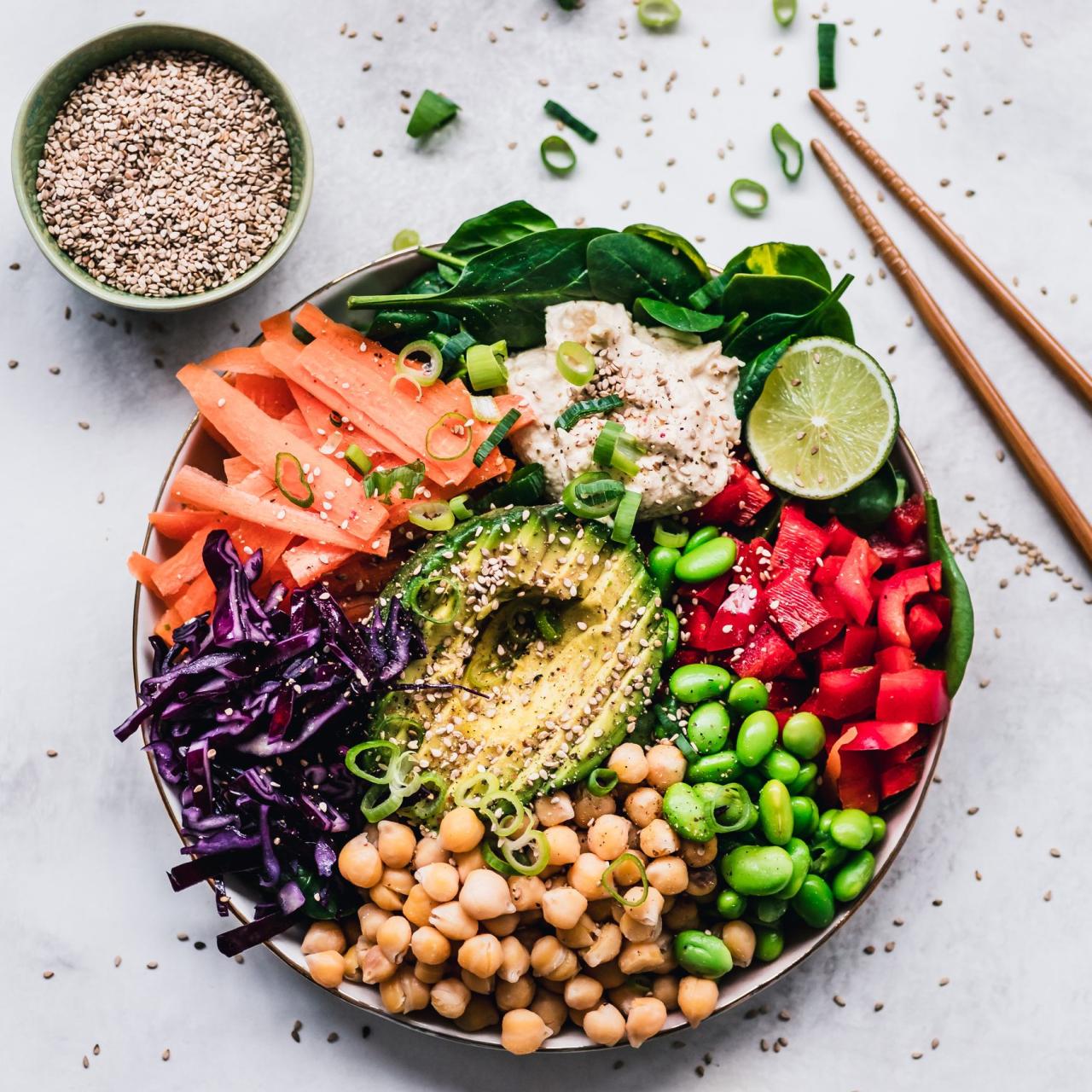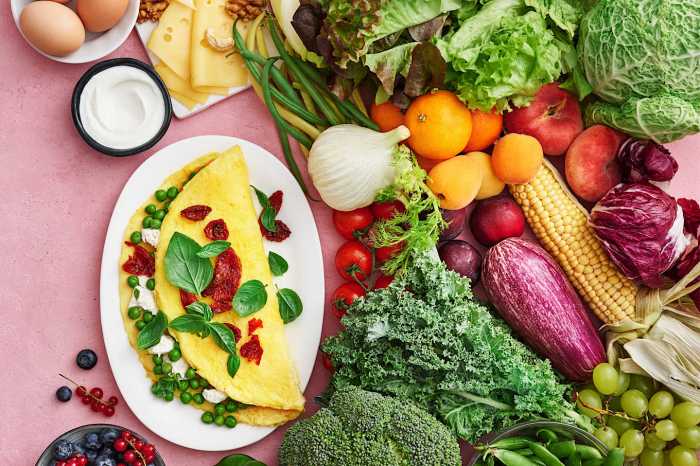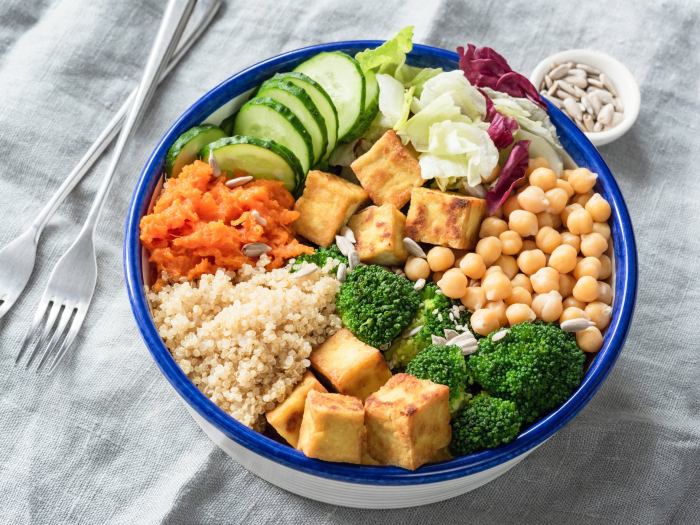How to have a healthy vegetarian diet sets the stage for this enthralling narrative, offering readers a glimpse into a story that is rich in detail and brimming with originality from the outset. Embark on a culinary adventure where plant-based nutrition takes center stage, unlocking a world of vibrant flavors and wholesome goodness.
Delve into the heart of vegetarianism, where an array of tantalizing dishes awaits, each brimming with the promise of nourishment and well-being. Discover the secrets to crafting balanced meals that satisfy both your taste buds and your body’s needs.
Introduction

Embracing a vegetarian diet offers a myriad of health benefits, making it a prudent choice for those seeking optimal well-being. Vegetarian diets are primarily plant-based, excluding meat, poultry, and fish. By incorporating a diverse array of fruits, vegetables, whole grains, legumes, and nuts, vegetarians can reap the rewards of a nutrient-rich and wholesome diet.
Research has consistently demonstrated that vegetarian diets are associated with a reduced risk of chronic diseases such as heart disease, stroke, type 2 diabetes, and certain types of cancer. The high fiber content in plant-based foods promotes satiety and aids in weight management.
Moreover, vegetarian diets are rich in antioxidants, which protect cells from damage and may contribute to increased longevity.
If you’re looking for a flexible and balanced approach to plant-based eating, the pesco pollo vegetarian diet may be the perfect choice for you. This diet incorporates elements of vegetarianism and pescatarianism, allowing you to enjoy the benefits of both while maintaining a healthy and sustainable lifestyle.
Nutritional Considerations
A vegetarian diet offers numerous health benefits, but it requires careful planning to ensure adequate intake of essential nutrients. Vegetarians must obtain nutrients typically found in animal products from plant-based sources.
Key nutrients to consider include protein, iron, calcium, vitamin B12, and omega-3 fatty acids. Consuming a variety of plant-based foods is crucial to meet daily nutrient recommendations.
Protein, How to have a healthy vegetarian diet
- Legumes (beans, lentils, chickpeas): Rich in protein, fiber, and iron.
- Soy products (tofu, tempeh): Complete protein sources with all essential amino acids.
- Nuts and seeds: Provide protein, healthy fats, and fiber.
- Whole grains (brown rice, quinoa): Offer protein, fiber, and B vitamins.
Iron
- Leafy green vegetables (spinach, kale): Excellent sources of non-heme iron, which is less readily absorbed than heme iron from meat.
- Beans and lentils: Rich in iron, fiber, and protein.
- Fortified foods (cereals, bread): Provide added iron to enhance intake.
Calcium
- Leafy green vegetables (collard greens, bok choy): Rich in calcium, vitamin K, and antioxidants.
- Fortified plant-based milks (soy milk, almond milk): Provide calcium comparable to dairy milk.
- Tofu and tempeh: Contain calcium, protein, and iron.
Vitamin B12
- Vitamin B12 is not naturally found in plant foods. Vegetarians must consume fortified foods (cereals, nutritional yeast) or supplements to meet daily requirements.
Omega-3 Fatty Acids
- Flaxseeds and chia seeds: Rich in alpha-linolenic acid (ALA), which the body can convert into EPA and DHA (omega-3 fatty acids).
- Algae oil supplements: Provide EPA and DHA directly.
- Some plant-based milks and yogurts are fortified with omega-3 fatty acids.
Meal Planning
Meal planning is essential for a healthy vegetarian diet. By planning your meals ahead of time, you can ensure that you are getting all the nutrients you need and that your meals are balanced and satisfying.
When planning your meals, it is important to include a variety of fruits, vegetables, whole grains, legumes, and nuts. These foods are all packed with nutrients that are essential for good health.
Variety of Foods
Fruits and vegetables are excellent sources of vitamins, minerals, and antioxidants. Whole grains are a good source of fiber, which is important for digestive health. Legumes are a good source of protein and fiber. Nuts are a good source of healthy fats, protein, and fiber.
While the pesco pollo vegetarian diet may seem like a restrictive way of eating, it can actually be quite flexible and nutritious. This diet allows for the consumption of fish and poultry, along with eggs and dairy products. Vegetarians who follow this diet can enjoy a wide variety of fruits, vegetables, and whole grains.
By including a variety of these foods in your diet, you can ensure that you are getting all the nutrients you need for good health.
Dietary Needs and Preferences
When planning your meals, it is also important to consider your individual dietary needs and preferences. If you have any allergies or food sensitivities, be sure to avoid foods that trigger your symptoms.
If you are following a specific diet, such as a low-carb or high-protein diet, be sure to plan your meals accordingly. You may also want to consider your taste preferences when planning your meals. If you don’t like certain foods, don’t force yourself to eat them.
There are plenty of other healthy vegetarian foods to choose from.
By following these tips, you can create healthy and balanced vegetarian meals that meet your individual dietary needs and preferences.
Recipes and Cooking Techniques
A diverse collection of nutritious and flavorful vegetarian recipes is essential for a healthy vegetarian diet. From salads and soups to entrees and desserts, there are endless possibilities for creating satisfying and wholesome vegetarian meals.
To enhance the flavor and nutritional value of vegetarian dishes, consider using various cooking techniques. These include:
Grilling and Roasting
Grilling and roasting bring out the natural flavors of vegetables and tofu. Grilled vegetables, such as bell peppers, zucchini, and onions, are a flavorful and colorful addition to salads, sandwiches, and entrees. Roasting vegetables, such as carrots, potatoes, and beets, caramelizes their natural sugars and intensifies their sweetness.
Sautéing and Stir-frying
Sautéing and stir-frying are quick and easy cooking methods that preserve the nutrients in vegetables. Sautéing vegetables in a small amount of oil, such as olive oil, allows them to soften and develop a slightly browned exterior. Stir-frying vegetables in a hot wok or skillet with a flavorful sauce creates a vibrant and flavorful dish.
Steaming and Blanching
Steaming and blanching are gentle cooking methods that retain the nutrients and vibrant colors of vegetables. Steaming vegetables over boiling water or in a steamer preserves their delicate flavors and textures. Blanching vegetables by briefly boiling them in water and then plunging them into cold water stops the cooking process and helps maintain their crispness.
Baking
Baking is a versatile cooking method that can be used to create a wide range of vegetarian dishes, including casseroles, quiches, and desserts. Baked vegetables, such as eggplant, tomatoes, and zucchini, are tender and flavorful. Baked tofu is a firm and flavorful meat alternative that can be used in a variety of dishes.
Common Challenges and Solutions: How To Have A Healthy Vegetarian Diet
Adopting a vegetarian diet can be incredibly rewarding, but it also presents certain challenges. This section will explore common difficulties vegetarians may encounter and provide practical solutions to overcome them.
One of the most significant challenges is ensuring adequate nutrient intake. Vegetarians need to pay special attention to their intake of protein, iron, calcium, and vitamin B12. Dietary supplements can be beneficial in supplementing these nutrients, but it’s crucial to consult a healthcare professional before taking any supplements.
Meal Planning
Meal planning is essential for vegetarians to ensure a balanced and nutritious diet. By incorporating a variety of plant-based foods into their meals, vegetarians can meet their nutrient needs. This includes consuming plenty of fruits, vegetables, whole grains, legumes, and nuts.
Social Stigma
Social stigma can be another challenge for vegetarians. Some people may not understand or support their dietary choices. It’s important for vegetarians to be confident in their decision and to educate others about the benefits of a plant-based diet.
Additional Considerations

To maintain a healthy vegetarian diet, it’s crucial to consider the role of processed foods and make informed choices.
Processed foods often contain unhealthy fats, added sugars, and sodium, which can contribute to weight gain and chronic diseases. Therefore, it’s essential to prioritize minimally processed foods like fruits, vegetables, whole grains, and legumes.
Maintaining a Healthy Weight
- Monitor calorie intake and adjust portion sizes as needed to maintain a healthy weight.
- Choose nutrient-dense foods that provide satiety and help regulate appetite.
- Engage in regular physical activity to support weight management.
Preventing Nutrient Deficiencies
- Ensure adequate intake of essential nutrients like iron, vitamin B12, calcium, and vitamin D.
- Consider fortified foods or supplements if necessary to meet daily requirements.
- Consult with a healthcare professional or registered dietitian for personalized advice on meeting nutrient needs.
Closing Summary

As you conclude your journey through the realm of vegetarian nutrition, may you carry with you a newfound appreciation for the power of plant-based cuisine. Let the vibrant flavors and wholesome ingredients inspire you to create culinary masterpieces that nourish your body and ignite your taste buds.
Remember, a healthy vegetarian diet is not merely a restrictive regimen but a gateway to a world of culinary exploration and vibrant well-being. Embrace the abundance of plant-based ingredients and let your creativity flourish in the kitchen. Bon appétit!
Questions Often Asked
What are the key nutrients that vegetarians need to pay attention to?
Vegetarians should focus on consuming adequate protein, iron, calcium, vitamin B12, and omega-3 fatty acids.
How can vegetarians ensure they’re getting enough protein?
Plant-based sources of protein include beans, lentils, tofu, tempeh, nuts, and seeds.
What are some tips for meal planning as a vegetarian?
Include a variety of fruits, vegetables, whole grains, legumes, and nuts in your meals. Consider meal prepping to save time and ensure you have healthy options available.
How can vegetarians navigate social situations where meat is often served?
Politely decline meat dishes and bring your own vegetarian options if necessary. Don’t be afraid to ask about vegetarian options at restaurants.